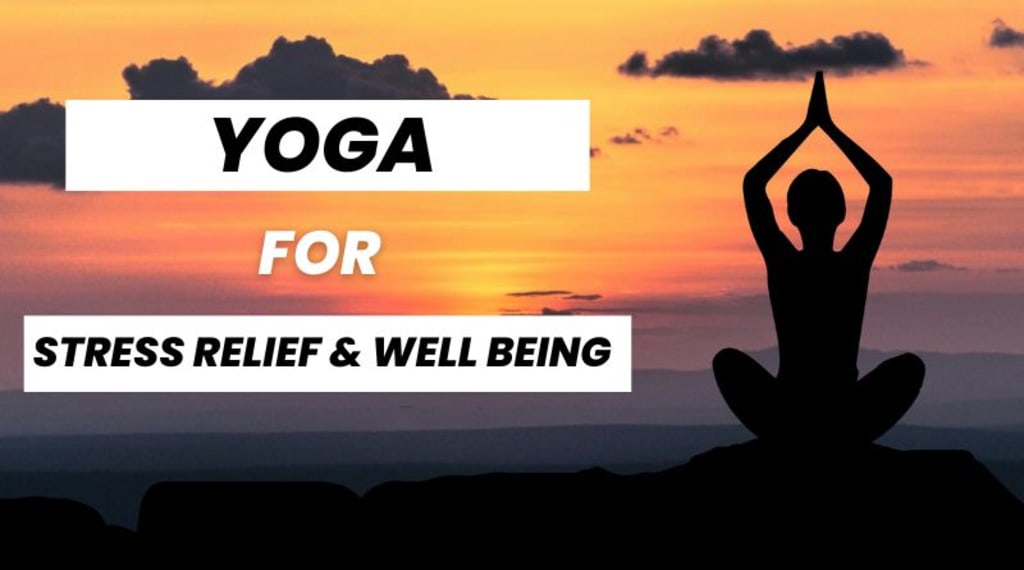Yoga: Unlocking the Path to Stress Relief and Well-being
Yoga is often considered an effective stress buster.

Yoga is often considered an effective stress buster for several reasons. Here are some key factors that contribute to its reputation:
Physical Benefits: Engaging in yoga involves various physical movements, postures, and stretches, which can help release tension and relieve physical stress in the body. Regular practice can enhance flexibility, strengthen muscles, improve posture, and increase overall physical well-being. These physical benefits can indirectly reduce stress by promoting relaxation and a sense of ease in the body.
Mind-Body Connection: Yoga places emphasis on the mind-body connection, encouraging individuals to be present and fully aware of their physical sensations, breath, and mental state during practice. This heightened awareness cultivates mindfulness, which has been shown to reduce stress and promote a sense of calm and relaxation. By focusing on the present moment, yoga helps individuals let go of worries about the past or future, which are common sources of stress.
Breathing Techniques: Yoga incorporates various breathing exercises, such as deep diaphragmatic breathing and alternate nostril breathing. These techniques activate the body's relaxation response, calming the nervous system and reducing the production of stress hormones like cortisol. By consciously controlling their breath, individuals can induce a state of calmness and relaxation, reducing stress and anxiety levels.
Stress Hormone Regulation: Yoga has been found to have a positive impact on the endocrine system, which plays a crucial role in regulating stress hormones. Regular practice of yoga has been shown to decrease cortisol levels, which is the primary stress hormone. By modulating these hormonal responses, yoga helps individuals better manage stress and its adverse effects on the body and mind.
Mindful Meditation: Yoga often incorporates meditation or mindfulness practices. These techniques involve focusing attention and clearing the mind of distracting thoughts. Regular meditation has been shown to reduce stress, improve emotional well-being, and enhance cognitive function. By training the mind to be more present and less reactive, individuals can develop a better ability to cope with stressors and maintain a sense of calmness in challenging situations.
Relaxation Response: Engaging in yoga activates the body's relaxation response, which counteracts the physiological and psychological effects of stress. This response includes a decrease in heart rate, blood pressure, and muscle tension while promoting feelings of tranquility and overall well-being. By regularly eliciting the relaxation response through yoga practice, individuals can effectively manage stress and its detrimental consequences.
Social Support: Participating in a yoga class or practicing with a group of individuals can provide a sense of social support, which can be beneficial for reducing stress. Interacting with others who share similar interests and experiences can create a sense of community, promoting feelings of belongingness and connectedness. This social support can help individuals better cope with stress by providing a support system and an outlet for emotional expression.
Self-Care: Engaging in regular yoga practice can be viewed as an act of self-care, which is important for overall well-being. By prioritizing self-care, individuals can cultivate a sense of self-worth and self-love, which can buffer against the negative effects of stress. Self-care can also help individuals develop a more positive attitude toward life, which can enhance resilience and coping skills.
Empowerment: Yoga can empower individuals to take charge of their own health and well-being. By providing a sense of control over one's physical and mental state, yoga can enhance self-efficacy, which is the belief in one's ability to overcome challenges. This sense of empowerment can help individuals better cope with stress by promoting a positive outlook and a sense of agency.
Variety: Yoga encompasses a wide range of practices, including different styles, postures, and breathing techniques. This variety allows individuals to find a practice that best suits their needs and preferences, which can make yoga a sustainable stress-busting tool. By experimenting with different styles and practices, individuals can find what works best for them and develop a customized yoga routine that can be integrated into their daily life.
In summary, yoga is often considered an effective stress buster due to its physical, mental, and emotional benefits. By promoting physical relaxation, mindfulness, breath control, hormonal regulation, and the relaxation response, yoga can help individuals better cope with stress and its adverse effects. Additionally, the social support, self-care, empowerment, and variety offered by yoga can make it a sustainable and enjoyable tool for stress management.
It's important to note that the benefits of yoga as a stress buster may vary from person to person. Some individuals may find other activities or practices more effective in reducing stress. It's always recommended to find what works best for you and to consult with a healthcare professional if you have any specific concerns.
If you find this piece interesting, please consider leaving a ❤️, or even a tip. Your support means a lot to me as a writer!
Give a look at my other stories...
About the Creator
Prashant Shekhar
Self Learned digital marketer and content writer. Helped a list of businesses achieve their goals. Creating SEO-friendly content for 5 years.
My website: Pacific SEO
Let's get in touch: LinkedIn






Comments
There are no comments for this story
Be the first to respond and start the conversation.